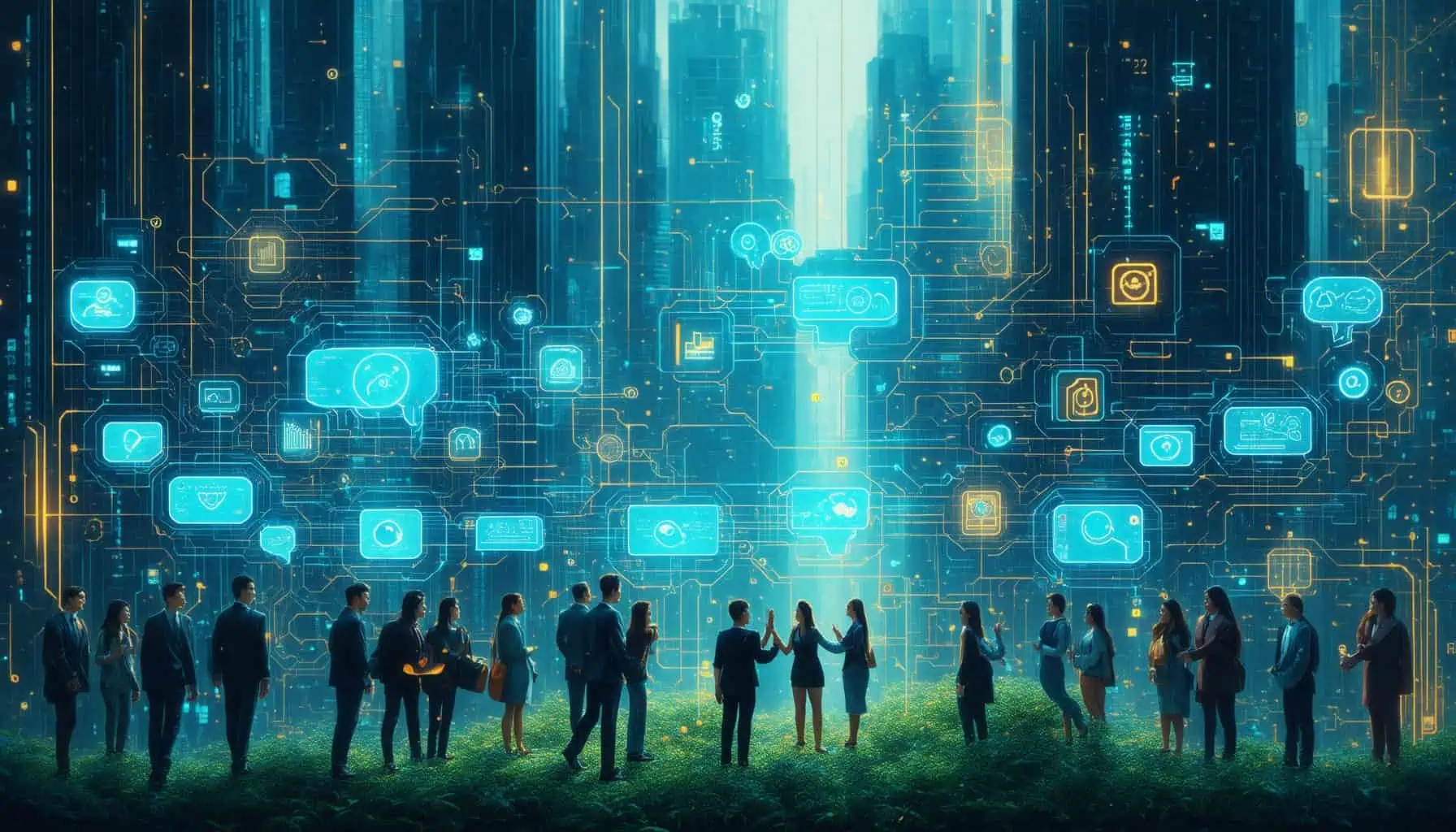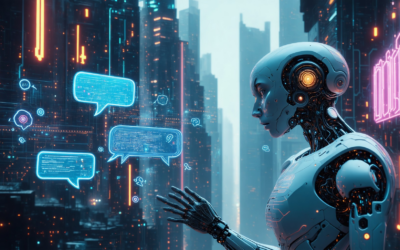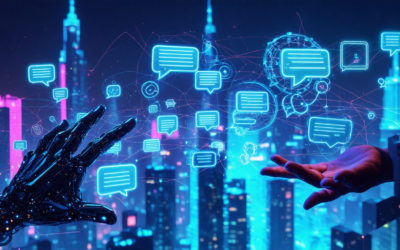Key Takeaways
- Transformative Power: AI chatbots are revolutionizing customer engagement and operational efficiency across various sectors.
- 24/7 Support: Providing round-the-clock assistance, chatbots significantly enhance customer satisfaction and response times.
- Cost Savings: Businesses can reduce operational costs by up to 30% through the automation of routine inquiries with chatbots.
- Personalization: Leveraging machine learning, chatbots deliver tailored interactions that boost customer loyalty and engagement.
- Data Insights: Chatbots collect valuable data, offering insights that inform marketing strategies and improve service delivery.
- Industry Versatility: From healthcare to e-commerce, AI chatbots serve diverse functions, including appointment scheduling and product recommendations.
- Future Potential: The evolving capabilities of chatbots, driven by advancements in NLP and AI, promise to reshape our interactions and business operations.
In today’s rapidly evolving digital landscape, AI chatbot uses have emerged as a transformative force across various sectors, enhancing user engagement and streamlining operations. This article delves into the multifaceted applications of AI chatbots, exploring their benefits and the technology that powers them. From customer service enhancements to innovative uses in healthcare and education, we will uncover how these intelligent systems are reshaping our daily interactions. Additionally, we will examine specific examples of chatbot technology in action, including the versatile applications of ChatGPT in content creation and marketing. As we navigate through the main purposes of chatbots and their role in personal assistance and productivity, you’ll gain valuable insights into the future of AI chatbot uses and their profound impact on society. Join us as we explore the exciting world of AI chatbots and discover how they are revolutionizing the way we communicate and conduct business.
What are AI chatbots used for?
AI chatbots are revolutionizing the way businesses interact with customers, providing a range of functionalities that enhance communication and streamline processes. By leveraging artificial intelligence, these chatbots can manage customer inquiries, automate responses, and improve overall engagement. The primary uses of AI chatbots include:
AI chatbot uses and benefits
1. Automated Issue Resolution: AI chatbots effectively manage common customer inquiries and resolve straightforward issues, allowing human agents to focus on more complex problems. According to a study by Gartner, by 2022, 70% of customer interactions will involve emerging technologies such as chatbots, enhancing operational efficiency.
2. 24/7 Availability: Chatbots provide instant support around the clock, significantly improving customer satisfaction and engagement. Research from HubSpot indicates that 90% of customers expect an immediate response when they have a customer service question.
3. Streamlined Processes: Chatbots guide users through various processes, including order tracking, returns, and product information requests, thereby simplifying the customer journey. A report by McKinsey highlights that businesses implementing chatbots can reduce operational costs by up to 30%.
4. Personalized Interactions: By leveraging machine learning, chatbots can learn from past interactions and tailor responses to meet individual customer needs, enhancing user experience. According to Salesforce, 70% of consumers say a company’s understanding of their personal needs influences their loyalty.
5. Sentiment Analysis: AI chatbots can analyze customer sentiment in real-time, enabling businesses to proactively identify and address potential issues. This capability is supported by research from IBM, which shows that sentiment analysis can improve customer retention rates.
6. Lead Generation: Chatbots engage website visitors, qualify leads, and gather valuable information, streamlining the sales funnel. A study by Drift found that 62% of consumers are open to interacting with chatbots for lead generation.
7. Product Recommendations: Chatbots can suggest relevant products and services based on customer preferences and browsing history, driving sales. According to a study by Epsilon, personalized recommendations can increase conversion rates by 10-30%.
8. Sales Assistance: Chatbots guide potential customers through the sales process, answering questions and providing information, which can lead to higher conversion rates. Research from Zendesk indicates that 67% of consumers have used a chatbot for sales assistance.
9. Promotional Offers: Chatbots can effectively announce promotions, discounts, and special offers, enhancing marketing efforts. A report by Statista shows that 50% of consumers are more likely to engage with brands that use chatbots for promotions.
10. Employee Onboarding: Chatbots assist new employees with inquiries about company policies, procedures, and benefits, streamlining the onboarding process. According to a study by the Society for Human Resource Management, effective onboarding can improve employee retention by 82%.
11. HR Support: Chatbots can address employee inquiries regarding HR-related matters, such as vacation requests and payroll questions, improving internal communication. Research from Deloitte indicates that organizations using chatbots for HR support see a 30% increase in employee satisfaction.
12. Knowledge Base Access: Chatbots provide employees with quick access to company knowledge and resources, enhancing productivity. A report by McKinsey states that organizations can improve productivity by 20-25% by utilizing AI for knowledge management.
13. Data Analysis: Chatbots can analyze data and generate reports, offering valuable insights for decision-making. According to a study by PwC, AI-driven analytics can improve business decision-making by 70%.
14. Healthcare: Chatbots are utilized for appointment scheduling, medication reminders, and providing health information, improving patient engagement. Research from Accenture shows that chatbots can reduce healthcare costs by up to 30%.
15. Education: Chatbots assist students with homework, provide tutoring, and answer questions, enhancing the learning experience. A study by Educause found that 60% of students prefer using chatbots for academic support.
16. Travel: Chatbots help users book flights, find hotels, and plan trips, simplifying travel arrangements. According to a report by Travelport, 75% of travelers are open to using chatbots for travel-related inquiries.
17. E-commerce: Chatbots assist customers with product inquiries, order placement, and returns, improving the online shopping experience. Research from Shopify indicates that businesses using chatbots see a 20% increase in sales.
18. Social Media: Chatbots manage social media accounts, respond to comments, and engage with followers, enhancing brand presence. A study by Sprout Social shows that 70% of consumers prefer interacting with brands through social media chatbots.
Overview of chatbot technology
Chatbot technology is built on advanced AI algorithms that enable them to understand and respond to human language. This technology encompasses several key components:
- Natural Language Processing (NLP): NLP allows chatbots to interpret user inputs, making conversations feel more natural and intuitive.
- Machine Learning: Through machine learning, chatbots improve their responses over time by analyzing past interactions and adapting to user preferences.
- Integration Capabilities: Chatbots can be integrated into various platforms, including websites, social media, and messaging apps, ensuring a seamless user experience.
- Data Analytics: Chatbots collect and analyze data from interactions, providing businesses with insights that can inform strategies and improve customer engagement.
By harnessing these technologies, AI chatbots like Messenger Bot can enhance digital communication, streamline processes, and provide valuable insights that drive business success. To learn more about AI chatbots, visit Messenger Bot.

How are chatbots used in real life?
Chatbots are increasingly utilized in various sectors to enhance customer interaction and streamline business operations. Here are some key applications of chatbots in real life:
AI chatbot examples in various industries
1. Customer Support: Chatbots provide 24/7 customer service, addressing inquiries and resolving issues without human intervention. This not only improves response times but also reduces operational costs. According to a report by Gartner, by 2022, 70% of customer interactions will involve emerging technologies like chatbots.
2. Lead Qualification: Businesses use chatbots to engage with potential customers in real time, qualifying leads by asking targeted questions. This process helps in directing prospects to the appropriate products or services, increasing conversion rates. A study by HubSpot found that companies using chatbots for lead generation saw a 30% increase in qualified leads.
3. E-commerce Assistance: In the retail sector, chatbots assist customers in navigating online stores, providing personalized product recommendations based on user preferences and past behaviors. For instance, Sephora’s chatbot offers makeup advice and product suggestions, enhancing the shopping experience.
4. Appointment Scheduling: Many service-oriented businesses, such as healthcare providers and salons, utilize chatbots to manage appointment bookings. This automation reduces no-shows and streamlines scheduling processes, as highlighted by a survey from Accenture, which found that 64% of consumers prefer using chatbots for appointment scheduling.
5. Feedback Collection: Chatbots can efficiently gather customer feedback through surveys and polls, providing businesses with valuable insights into customer satisfaction and areas for improvement. This data can be crucial for enhancing products and services.
6. Integration with Messaging Platforms: Chatbots are often integrated into popular messaging platforms like Facebook Messenger, allowing businesses to reach customers where they are most active. This integration facilitates seamless communication and enhances user engagement.
Uses of chatbot in daily life
Chatbots have become an integral part of our daily interactions, simplifying various tasks and enhancing convenience. Here are some common uses:
1. Personal Assistants: Many individuals use chatbots as personal assistants to manage daily tasks such as setting reminders, scheduling events, and providing weather updates. This functionality streamlines daily routines and improves productivity.
2. Social Media Engagement: Chatbots are widely used on social media platforms to engage users through interactive content, quizzes, and customer service. This engagement helps brands maintain a strong online presence and fosters community interaction.
3. Travel Assistance: Travel chatbots assist users in booking flights, hotels, and providing real-time updates on travel itineraries. They can also offer recommendations for local attractions, enhancing the travel experience.
4. Health Monitoring: In the health sector, chatbots can provide users with health tips, medication reminders, and even preliminary health assessments based on user input. This application promotes proactive health management.
In conclusion, chatbots serve as a versatile tool for businesses and individuals alike, improving customer service, increasing efficiency, and driving sales. As technology advances, the capabilities of chatbots will continue to evolve, making them an essential component of modern life. To learn more about AI chatbots, visit Messenger Bot.
What are the uses of ChatGPT?
ChatGPT is an advanced AI chatbot developed by OpenAI, utilizing cutting-edge natural language processing (NLP) technology to facilitate human-like conversations. Its versatility allows users to engage in a wide range of tasks, making it a valuable tool across various domains. Here are some key uses of ChatGPT:
ChatGPT applications in customer service
- Customer Support: ChatGPT can handle customer inquiries, providing instant responses and solutions, which enhances user experience and reduces wait times. According to a study by McKinsey, AI-driven chatbots can improve customer satisfaction by up to 30%.
- Personalized Learning: Educators can use ChatGPT to create customized learning experiences, answering student queries and providing explanations tailored to individual learning styles. The Bill & Melinda Gates Foundation emphasizes the importance of personalized learning in improving educational outcomes.
- Lead Generation: By engaging users in meaningful conversations, ChatGPT can help businesses identify potential leads and nurture them through the sales funnel, ultimately driving conversions.
ChatGPT in content creation and marketing
- Content Creation: This AI tool assists in generating high-quality written content, including articles, blog posts, and marketing copy. A report from HubSpot indicates that companies using AI for content creation see a 50% increase in productivity.
- Creative Writing: Authors and content creators can leverage ChatGPT for brainstorming ideas, developing plots, and even writing poetry. A survey by the Authors Guild found that 60% of writers believe AI can enhance their creative processes.
- Data Analysis: ChatGPT can assist in interpreting data and generating insights, making it a useful tool for analysts and researchers. According to Gartner, organizations that utilize AI for data analysis can achieve a 25% increase in decision-making speed.
Where are AI bots used?
AI bots are increasingly utilized across various sectors, enhancing efficiency and user experience. Here are the top use cases for AI bots in 2023:
AI bots in healthcare and education
In the healthcare sector, AI bots play a crucial role in improving patient engagement and streamlining processes. They are used for:
- Telemedicine Support: AI bots provide preliminary diagnoses, schedule appointments, and remind patients about medications, making healthcare more accessible.
- Patient Interaction: By answering common health-related queries, AI bots help reduce the burden on healthcare professionals, allowing them to focus on more complex cases.
In education, AI bots enhance learning experiences by:
- Tutoring: They offer personalized tutoring sessions, adapting to individual learning styles and needs.
- Administrative Assistance: AI bots can manage student inquiries and facilitate learning management systems, improving operational efficiency in educational institutions.
AI bots in e-commerce and retail
AI bots are revolutionizing the e-commerce and retail landscape by enhancing customer interactions and driving sales. Key applications include:
- Customer Support: AI bots provide 24/7 assistance, handling inquiries about products, order tracking, and returns, which significantly improves customer satisfaction.
- Sales and Lead Generation: By engaging potential customers through personalized interactions, AI bots qualify leads and guide them through the sales funnel, leading to higher conversion rates.
- Product Recommendations: AI bots analyze user behavior to suggest products, enhancing the shopping experience and increasing sales opportunities.
By integrating AI bots into healthcare, education, e-commerce, and retail, businesses can streamline operations and significantly enhance user experience, making them an invaluable tool in today’s digital landscape. To learn more about how AI chatbots can transform your business, visit Messenger Bot.

What is the main purpose of chatbot?
Chatbots serve multiple essential purposes in modern communication and customer service, enhancing user experience and operational efficiency. Here are the primary functions of chatbots:
- Automated Customer Support: Chatbots provide instant responses to customer inquiries, addressing common questions and issues 24/7. This reduces wait times and improves customer satisfaction. According to a study by IBM, businesses can save up to 30% on customer support costs by implementing chatbots.
- Lead Generation and Qualification: Chatbots can engage website visitors, collect information, and qualify leads by asking relevant questions. This process helps businesses identify potential customers and tailor their marketing strategies effectively.
- Product Recommendations: By analyzing user preferences and behavior, chatbots can suggest products or services that align with customer needs. This personalized approach can significantly increase conversion rates.
- Appointment Scheduling: Many chatbots are equipped to handle scheduling tasks, allowing users to book appointments or reservations directly through the chat interface, streamlining the process for both customers and businesses.
- Feedback Collection: Chatbots can solicit feedback from users after interactions, providing valuable insights into customer satisfaction and areas for improvement.
- Integration with Messaging Platforms: Chatbots can be integrated with popular messaging platforms, such as Facebook Messenger, allowing businesses to reach customers where they already communicate. This integration enhances accessibility and user engagement.
Enhancing user experience with chatbots
One of the primary purposes of chatbots is to enhance user experience. By providing immediate assistance and personalized interactions, chatbots create a more engaging environment for users. They can guide customers through complex processes, answer queries in real-time, and ensure that users feel valued and understood. This level of interaction not only improves satisfaction but also fosters loyalty, as customers are more likely to return to a brand that offers efficient and friendly service.
Streamlining business operations through AI chatbots
AI chatbots significantly streamline business operations by automating repetitive tasks and freeing up human resources for more complex issues. This efficiency leads to reduced operational costs and improved productivity. For instance, by handling customer inquiries and support tickets, chatbots allow staff to focus on higher-level tasks that require human intervention. Additionally, the data collected by chatbots can provide insights into customer behavior, helping businesses refine their strategies and improve service delivery. To explore how to set up your first AI chatbot, visit this guide.
What is chat AI good for?
Chat AI in personal assistance and productivity
Chat AI, or artificial intelligence chatbots, are increasingly utilized across various sectors for their ability to enhance user interaction and streamline processes. Here are some key benefits and applications of chat AI:
1. **Personalized User Experience**: Chat AI leverages customer data to create tailored interactions. By analyzing user behavior and preferences, these chatbots can provide personalized recommendations, improving customer satisfaction and engagement.
2. **24/7 Availability**: Unlike human agents, chat AI can operate around the clock, ensuring that users receive assistance at any time. This constant availability can significantly enhance customer service and support.
3. **Cost Efficiency**: Implementing chat AI can reduce operational costs for businesses. By automating routine inquiries and tasks, companies can allocate human resources to more complex issues, leading to increased efficiency.
4. **Scalability**: Chat AI can handle multiple interactions simultaneously, allowing businesses to scale their customer service efforts without a proportional increase in staffing.
5. **Data Collection and Insights**: Chatbots can gather valuable data from user interactions, providing businesses with insights into customer preferences and behavior. This data can inform marketing strategies and product development.
6. **Integration with Other Tools**: Many chat AI systems can integrate with platforms like Messenger Bot, enhancing their functionality and allowing for seamless communication across different channels.
7. **Natural Language Processing (NLP)**: Advanced chat AIs utilize NLP to understand and respond to user queries more effectively, making interactions feel more natural and human-like.
By incorporating these features, chat AI not only improves user experience but also drives business efficiency and growth.
Chat AI in data collection and analysis
Chat AI plays a crucial role in data collection and analysis, providing businesses with actionable insights that can enhance decision-making processes. Here are some significant uses:
1. **User Interaction Tracking**: Chatbots can monitor and record user interactions, allowing businesses to analyze engagement patterns and preferences. This data is invaluable for refining marketing strategies and improving service offerings.
2. **Feedback Collection**: Chat AI can facilitate the collection of customer feedback through surveys and direct inquiries, enabling businesses to gauge satisfaction and identify areas for improvement.
3. **Market Research**: By engaging users in conversations, chatbots can gather information about market trends and consumer behavior, assisting businesses in adapting their strategies to meet evolving demands.
4. **Performance Metrics**: Chat AI can provide detailed analytics on response times, user satisfaction rates, and interaction volumes, helping businesses assess the effectiveness of their customer service efforts.
5. **Predictive Analysis**: Advanced chat AI systems can utilize historical data to predict future trends and customer needs, allowing businesses to proactively address potential issues and capitalize on opportunities.
In conclusion, the integration of chat AI into data collection and analysis not only enhances operational efficiency but also empowers businesses to make informed decisions based on real-time insights.
Conclusion: The future of AI chatbot uses and their impact on society
As we look ahead, the future of AI chatbots is poised to transform various aspects of our daily lives and business operations. With advancements in technology, these intelligent systems are becoming more sophisticated, enabling them to handle complex tasks and provide personalized experiences. The integration of AI chatbots into different sectors is not just a trend; it signifies a shift towards more efficient and user-centric communication.
Emerging trends in chatbot technology
One of the most significant emerging trends in chatbot technology is the increased use of natural language processing (NLP) and machine learning algorithms. These advancements allow chatbots to understand context, sentiment, and user intent more accurately, leading to improved interactions. For instance, platforms like Brain Pod AI are leveraging these technologies to enhance their chatbot capabilities, offering features such as multilingual support and advanced analytics.
Additionally, the rise of voice-activated chatbots is changing how users interact with technology. As smart speakers and voice assistants become more prevalent, businesses are adapting their chatbot strategies to include voice recognition, making it easier for users to engage without typing. This trend is particularly beneficial in sectors like e-commerce, where quick and efficient customer service is essential.
The evolving role of chatbots in everyday life
Chatbots are increasingly becoming integral to our everyday lives, from managing personal schedules to providing instant customer support. In the realm of personal assistance, AI chatbots can help users organize tasks, set reminders, and even suggest activities based on preferences. This capability not only enhances productivity but also improves overall user satisfaction.
Moreover, in the business landscape, chatbots are streamlining operations by automating routine tasks such as lead generation and customer inquiries. By utilizing platforms like Messenger Bot, businesses can implement automated workflows that respond to user behaviors, thereby enhancing engagement and efficiency. As these technologies continue to evolve, the potential for AI chatbots to impact society positively is immense, paving the way for more innovative and user-friendly solutions.





